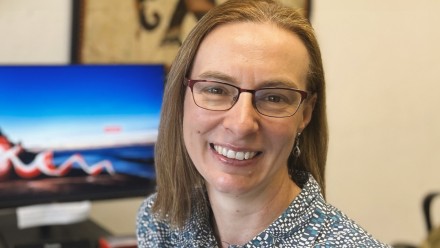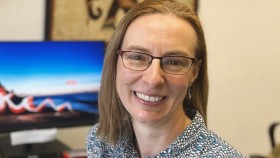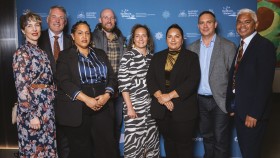Not for sale
Share
Preventing human trafficking through sustainable livelihood programs, India.
As an Australian woman, human trafficking doesn’t enter my mind as something that could affect my life. This fear, however, is very real for millions of women around the world. Women who live in countries that have suffered extended periods of war and political unrest are particularly vulnerable to this risk.
Tatum Street is also an Australian woman, but unlike me, she has thought very deeply about human trafficking. Her experience with Non-Government Organisations (NGOs) in India exposed her to the scale of the problem, and fuelled her desire to work further with programs that address this issue.
“The Assam region in north east India is a critical hotspot for human trafficking,” says Tatum. “The area has suffered decades of political insecurity, the borders are extremely porous, and women have limited economic opportunities.”
Tatum, a research assistant with the Humanitarian Health Research Initiative, Research School of Population Health, collaborates with Impulse NGO Network. The NGO combats human trafficking by engaging with key stakeholders such as government, law enforcement, private sector institutes, and of course women vulnerable to trafficking and those who have survived it.
Part of this effort includes a social enterprise that helps women build sustainable livelihoods, thus breaking down one of the risk factors conducive to trafficking – poverty.
“Opportunities for women in this region are limited. India is still a very patriarchal society, and this is particularly so in communities that retain more traditional ways of living such as Assam,” says Tatum.
Working predominantly with tribal women, the NGO taps into their traditional weaving skills providing them with raw materials to make bags, scarves, and home decorations. These items are then sold online and in retailers in India.
“The program has been successful in engaging with women and helping them source an income. But like many NGOs they don’t have the resources to rigorously evaluate and document why aspects of their program are successful or where gaps exist,” says Tatum.
Establishing this evidence base was the focus of Tatum’s Masters project at ANU. Tatum engaged with women to learn about their personal experience with the livelihood program.
“Too often we hear about empowering women at the policy level, but it’s the women who need to decide what this looks like. And we need to talk with them directly,” says Tatum.
The dominant theme from her conversations was how the program facilitates intergenerational change.
“The women spoke with resignation that they didn’t have an education. They want their children to finish school and have access to greater opportunities in their lives than they do. This was one of the main benefits from generating their own income through the program – the choice and means to make a difference to the lives of their children, particularly their daughters, through education,” says Tatum.
This is significant in the Indian context, where large numbers of girls are still denied an education. One woman involved in the program told Tatum:
“Income is important for women, and it is important for women to work so that they don’t have to rely on their husband for everything. When the man is the sole breadwinner, he feels superior. When women earn for themselves, they are not seen as inferior and they don’t feel inferior in their home.”
Women involved in the program have the autonomy to organise their weaving work according to their own needs. This flexibility is essential, as most women are involved in a range of other day-to-day household and seasonal activities such as farming and rice cultivation.
Artisans walking with a handloom in Assam. Photo: Impulse Social Enterprises.
Tatum’s discussions with women covered a number of other social issues including domestic violence. She documented that while most of the women believe domestic violence is a crime, they had little knowledge of what to do if they or someone they knew were experiencing it. This evidence combined with greater resource capacity meant the NGO can focus on delivering more social awareness programs as part of their work. This is an example of how operational research can add value to existing programs.
“Being on the ground and talking to people provides so much more knowledge than just a desktop literature review. It’s important to engage with people – they are living these problems every day,” says Tatum.
My conversation with Tatum circled back around to trafficking in Australia. It’s true that I’m reasonably safe from trafficking here, but it’s not a historical artefact and certainly happens today.
“Australia is a destination country for women trafficked into the sex industry,” says Tatum.
“Current research suggests around 2,000 women are trafficked to Australia each year for sexual exploitation. The overwhelming majority of these women arrive from South East Asian countries and China. This fact must make us consider the extent of exploitation in Australia’s domestic sex industry, and the need to confront our own role in this global problem.”
***
The COVID-19 pandemic has devastated livelihoods in rural India, making women and children even more vulnerable to trafficking. Women part of the Impulse NGO Network of weavers have pivoted their production to sew reusable face masks that comply with World Health Organisation guidelines. The masks are being distributed to essential workers and rural communities, and help provide income security for women at risk of trafficking during this uncertain time.
Learn more about how Impulse NGO Network are raising funds to support weavers during COVID-19.
Find out more about Impulse NGO Network, Impulse Social Enterprises, or help empower women in remote Indian communities by purchasing their artesian products.
***
Tatum Street was awarded the University Medal in 2019 for her Masters thesis titled ‘Building livelihoods to prevent exploitation and human trafficking—home-based microentrepreneurial activities and tribal women’s empowerment in Assam' for the degree of Master of Asian and Pacific Studies (Advanced). Tatum currently works for the Humanitarian Health Research Initiative at the Research School of Population Health, and will continue her collaboration with Impulse NGO through her PhD studies.
By Liz Drummond.














